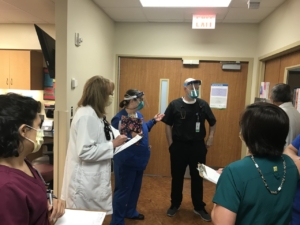July 6, 2023
Exploring the top 5 best practices for Sound Critical Care: Multidisciplinary rounds
By Hesham Hassaballa, MD, FCCP, FAASM

The critical care unit is a truly special place. It’s where we care for the sickest, most vulnerable patients. Clinicians must be on their toes, as patients can rapidly deteriorate to near death within seconds. While the critical care unit is intimidating, it is home to the intensivist. We’re specialists dedicated to caring for critically ill patients. Sound Critical Care’s mission is for every one of our ICU programs to have an intensivist leading patient care.
And yet, critical care medicine is a team sport. While the intensivist is at the helm of care — the “captain of the ship,” as it were — many other clinicians work in the ICU alongside them. Their expertise is essential to providing comprehensive, evidence-based care to patients admitted to the ICU. These clinicians include ICU nurses, respiratory therapists, physical therapists, occupational therapists, nutritionists, case managers, chaplains, and palliative care specialists. For teams like this, multidisciplinary rounds are essential.
Multidisciplinary rounds (MDRs) are daily meetings of all the clinicians in the ICU. Together, they go over the care of patients systematically and comprehensively. Typically, MDRs have a checklist for each patient that the whole team reviews together.
We conduct MDRs at the bedside. Families are invited to listen and actively encouraged to participate in rounds to offer insight and ask questions. Ideally, MDRs are conducted every day of the year. Some ICUs even conduct abbreviated MDRs at night.
Implementing robust MDRs is part of what Sound Critical Care does in every ICU in which it provides care. As one of our Top Five Best Practices, one of the very first things Sound Critical Care does at the start of a new ICU program is work on implementing MDRs.
As a program medical director, I hold a review with my performance improvement leadership team every quarter. Even though my program is in its eleventh year, they still check in with me about how the MDRs are going in my ICU — that’s how essential MDRs are to our practice.
Caring for critically ill patients is challenging. The disease processes are complex, the patients are incredibly sick, and the care is exceptionally fast-paced. Luckily, intensivists do not face it alone. They are part of a team of clinicians who provide expert care and expertise and collaborate to ensure optimal patient care. No Sound Critical Care ICU program can do without them.
